- Home
- Joel C. Rosenberg
The Copper Scroll Page 9
The Copper Scroll Read online
Page 9
“Meaning what?” asked Jon.
“Meaning I don’t want us to simply rebuild the Temple. I want to fill it with the lost treasures from the First and Second Temple eras. I want pilgrims to come from all over the world and see ancient biblical history come alive, right before their eyes. I want them to be able to see the past—touch it, experience it—and thus have hope for the future.
“That’s why immediately after the firestorm, I authorized funding for a team of the world’s leading archeologists and experts on the First and Second Temple periods. I asked them to search heaven and earth for the greatest Jewish treasures of the ages. I figured if Eli was right about even a small fraction of what he was saying—if we really are living in what the Scriptures call ‘last days’—then anything’s possible. Maybe the God of Israel is about to reveal that which has been hidden for centuries.”
Bennett’s head swam as he tried to make sense of all that Doron was telling him. “But how is all this related to Dr. Mordechai’s death?” he asked.
“Well, that’s just it,” Doron continued. “About a month ago, I got an update from Mordechai and the team of archeologists I’d put together. They told me they had new leads. The team seemed excited about the progress they were making. And then . . . ” Doron paused. He shoulders seemed to slump a bit.
“Then what?” asked Bennett.
“And then one by one, the team started dying, starting with Lionel Mansfield, then George Murray, then Barry Jaspers, and now Eli himself.”
Mansfield. The name surprised Bennett, but it registered instantly. Professor Lionel Mansfield was the famed British archeologist from Oxford who had died in a mysterious car accident in London a few weeks earlier. That was the story he’d been trying to remember when he heard about Murray’s death in Washington.
“You think their deaths are related?”
“I’m absolutely sure of it,” said Doron. “They were all part of this clandestine archeological team I put together, and now they’re all dead.”
“What was Dr. Mordechai’s take, before he died?”
“We actually talked about the Mansfield and Murray deaths by phone while he was at your reception,” Doron replied. “He had no doubt the murders were related. He just couldn’t figure out how anyone could have known that both men were part of this team I’d assembled. There’s been no publicity about the Temple project, or the team, or anything. Not yet. Even now, only a handful of people know what we’re up to.”
“Then you’ve got a leak,” said Bennett.
Doron shook his head. “That’s what I said. But Eli said, ‘No, it’s worse than that. It’s not only a leak. People are dying. You’ve got a mole.’ It didn’t seem possible. I personally selected each member of the team. Only a handful of my senior aides knew anything about it. But what else could it be? So I asked Eli to launch a mole hunt the minute he got back from Washington. And now look what’s happened.”
“Was anyone else on this team of archeologists?” asked Bennett.
“Just one,” said Doron. “Yossi Barak over at the Israel Museum.”
“Did you say Barak?”
“Yes, do you know him?” asked Doron.
Break. Brock. Broke. Could that be it—Yossi Barak?
“I’ve never heard of him until now,” said Bennett. “But just before Dr. Mordechai died, he was trying to tell me something. It was hard to hear him. At the time I wasn’t sure what he was saying, but that may have been it. Yossi Barak.”
“That would make sense,” said Doron. “They’ve been friends for years.”
“And who is he?”
“Yossi is the chief archeologist at the Israel Museum. He’s also the head of the Archeology Department at Hebrew University and the world’s leading expert on the Copper Scroll.”
“The what?” asked Bennett.
“The Copper Scroll,” Doron repeated. “Eli never told you about it?”
“No, why? What is it?”
The prime minister pulled out a pen and a small piece of paper, wrote down Barak’s name and private phone numbers, and handed it to Bennett. “Call him. Tell him you need to see him immediately and that I said it’s urgent. He’ll know who you are and why you’re coming. I’ll have a car meet you downstairs.”
Bennett wasn’t sure how to respond. He was still in shock over his mentor’s death. He had a grieving wife to care for, and he was supposed to be on his honeymoon. The last thing he needed to be doing was tracking down a serial killer. But Mordechai’s dying request was that they find whoever was responsible and stop him before something far worse happened, and something told him he’d better move quickly.
18
TUESDAY, JANUARY 13 – 7:32 p.m. – BABYLON, IRAQ
Khalid Tariq poked his head into the darkened office.
He expected to find President Al-Hassani reviewing his stack of briefing books for the upcoming visit of European Union foreign minister Salvador Lucente. The trip was shaping up to be a critical one. Lucente’s aides were hinting that their boss was bringing a new proposal to discuss but had no other details, and given that Al-Hassani’s own plans were likely to cause a great deal of anxiety in Brussels, they had to be ready.
But Al-Hassani was no longer sitting at his desk. Rather, he had settled into a rocking chair by a crackling fireplace, surrounded by his beloved books. Among them were Churchill’s The Gathering Storm, Gibbon’s The Decline and Fall of the Roman Empire, Tuchman’s The Guns of August, and The United States of Europe: The New Superpower and the End of American Supremacy by former Washington Post reporter T.R. Reid, which Al-Hassani had become fond of quoting of late. Each was dog-eared and on the verge of falling apart, having not just been read but thoroughly devoured by a man desperate to make up for the years Saddam Hussein and his thugs had stolen.
Tonight Al-Hassani’s head was buried in yet another thousand-page tome of some kind, and while Tariq from his vantage point could not see the title, he could see the ubiquitous yellow highlighter in Al-Hassani’s left hand and the steaming cup of cardamom tea in his right. It was an all-too-rare moment of literary solace for a onetime professor so long deprived in prison of the reading materials that had once been his life and who was now once again increasingly deprived of the time with which to enjoy them.
Tariq cleared his throat. “Forgive me, Your Excellency.”
Al-Hassani motioned for his aide to enter, though he remained fixated on the book in his lap. “Khalid, how much do you know of the British monarchs?”
“Not much, I’m afraid.”
“Then you must read this when I am finished. Did you know, for example, that at the funeral of England’s King Edward VII in 1910, nine of the kings and queens in attendance were actually related to him?”
“I did not.”
“It’s true,” said Al-Hassani, with a long-dormant passion rising in his voice. “His son, George V, was the new king of England. One of his daughters was the queen of Norway. His nephew Wilhelm II was the kaiser of the rising German empire. His nephew Nicholas II was the czar of Russia. One of his nieces was the czarina of Russia. Another niece was the queen of Spain, and yet another niece would soon become the queen of Romania.”
Al-Hassani looked up from his book and removed his reading glasses. “The secret of success is successors, Khalid. It is not enough merely to rule an empire. You must raise up future emperors who will expand and enlarge your borders long after you have rested with your fathers.”
“I concur, Your Excellency, but was it not shortly after King Edward’s death that the sun began to set on the British Empire and on the whole of Europe?”
“It was, Khalid,” said Al-Hassani. “Mistakes we shall not revisit. To paraphrase Santayana, we must learn from history, particularly the history of Europe, lest we be doomed to repeat it.”
“Forgive me, Your Excellency, but I have Viggo Mariano on the line. I passed on your message, but he would still like to talk with you personally.”
“Is the call secu
re?” Al-Hassani asked instinctively.
“It is, Your Excellency. We ran a trace. It’s clean.”
“Where is he calling from?”
“Rome.”
“Very well,” said Al-Hassani. He waved Tariq out of the room and waited for him to transfer the call.
* * *
Viggo Mariano was a killer for hire.
And to Mustafa Al-Hassani, the Sicilian would be worth every penny—$2 million up front, $3 million upon completion, and half the treasure, if it was ever recovered—if he could actually deliver what he promised on time.
The youngest son of one of the founding members of the Red Brigades that had struck fear in the hearts of Europeans throughout the 1970s and 1980s, Mariano, now forty-six, had cut his teeth in the world of international terror. Living in the shadows, off the grid, always on offense, had simply become part of his DNA in his earliest years. If everything Al-Hassani had heard from friends and associates was true, no one in the underworld had a better track record of success.
It was said that Mariano and his small team of associates had personally been involved in the assassinations of twenty-three of the thirty-seven highest-profile CEOs and parliamentarians killed in Europe and the Middle East over the past decade. They were wanted by police in every country in Europe—and by different names in each country.
Al-Hassani had first met Mariano as Bernardo Carlucci, operating under the cover of a cell-phone dealer in Palermo. They had been introduced by Tariq on a trip to Sicily almost a year before. Mariano and Tariq had been roommates during their undergraduate studies in Milan, but few who knew them at the time would have ever imagined the partnership they had forged more than twenty-five years later or the role they would play in Al-Hassani’s rise to power.
“I just heard from my team,” said Mariano when the call was patched through to the Iraqi president. “Mordechai is dead.”
“Good,” said Al-Hassani. “That makes four?”
“Correct. Operation Black Box is proceeding as planned and on schedule.”
“What about number five?”
“You should hear something tomorrow. Thursday at the latest.”
“And the other matters?”
“My team is working on the location of the treasure as we speak.”
“How much longer?”
“There are no guarantees,” said Mariano. “We still don’t know for sure if it even exists or if the information we have is accurate.”
“You assured me it was.”
“No. I said if it was accurate, we would find it.”
“Don’t play games with me, Viggo. I don’t have the luxury of time.”
“I’m not playing games, Your Excellency. I just want to be clear about our agreement. I cannot deliver what doesn’t exist.”
“It exists, all right. You told me yourself that Murray and Jaspers were sure of it. So was Mordechai.”
“Then perhaps we should have let them live a little longer, until they led us to it.”
“No,” said Al-Hassani, his patience growing thin. “We discussed that. It was too risky. We can’t risk the treasure falling into the hands of the Jews. I cannot stress that enough.”
“Then with all due respect, Your Excellency, I am not sure what more I can do but update you on our progress as often as I can.”
“Push your men harder.”
“I cannot push them any harder than I already am.”
“Yes, you can, Viggo,” Al-Hassani demanded. “And you will.”
19
TUESDAY, JANUARY 13 – 6:49 p.m.–JERUSALEM, ISRAEL
Bennett found his wife resting in a lounge off the ICU.
She was quiet now and eager to get back to the King David to rest and deal with everything that had just happened, and so was he. He thanked Costello for keeping an eye on her and promised to call him the next day. Then he briefed Erin on his conversation with the prime minister, conceding that for now, all he had were questions, not answers. Had Mordechai been killed for his faith or because of Doron’s assignment? Who was Yossi Barak? Another target? A coconspirator? What in the world was the Copper Scroll, and how did it relate to any of this?
“So what do you want to do?” asked Erin when he’d laid it all out.
“Take you back to Ronda and pretend this never happened.”
She tried to smile through weary eyes, and he took her in his arms. Every fiber of his being screamed run. He had already seen so much violence and so much evil, and the last thing he wanted to do was face any of it again.
He had nearly lost Erin to terrorists in Moscow, and neither of them could bear the thought of going through that again. Why couldn’t they just live a quiet, peaceful life with a house in the country, maybe have a few dogs to run with, kids they could take fishing and hiking in the mountains? He had never signed up for any of this. He’d been dragged into it by a president who had betrayed him, and he wanted out. For good. Yet even now, months after his resignation, he still couldn’t seem to break free.
“But I have a hard time saying no to a man’s dying request,” he continued at last.
“Me too,” she said. “I think we’d dishonor his memory—and his sacrifice for us—if we walked away now.”
“So you think we should stay here?” Bennett asked, just to be sure.
Erin nodded slowly. “I don’t think we have a choice.”
Bennett pulled her closer to him and silently thanked God for her. He didn’t deserve this woman, but for the life of him, he couldn’t imagine living without her.
He pulled out his BlackBerry and the slip of paper Doron had given him and dialed Barak’s private number.
After three rings, a young woman picked up. “Hello?”
“Uh, yeah, my name is Jon Bennett. I am looking for a Yossi Barak.”
“Hi, Mr. Bennett, my name is Natasha. Dr. Barak is my grandfather. He just spoke to the prime minister. We were expecting your call. But let me say I am so sorry for your loss. Dr. Mordechai was a dear friend of both of ours.”
“That’s very kind,” said Bennett. “It’s a hard moment for all of us.”
“It is indeed,” said the woman.
“And, I’m sorry,” Bennett added, eager to change the subject, “is this Dr. Barak’s home, or . . . ”
“No, no, this is his Hebrew University office at Mount Scopus.”
“And you work there as well?”
“I do. I’m an associate professor of Near East archeology. Normally there’s a secretary here, but she’s already gone home for the day. That’s how you got me.”
“So may I speak to your grandfather?”
“Actually, I’m afraid that’s not possible right now.”
“I don’t understand,” said Bennett. “I was under the impression that—”
“I realize the urgency, as does my grandfather. But he wanted to arrange some things before meeting with you. I explained all this to the prime minister. He understands. My grandfather and I can meet you and your wife tomorrow morning at ten o’clock. I hope that is acceptable, under the circumstances.”
Bennett wasn’t sure what was going on but he didn’t have the emotional energy to argue. He and Erin both needed rest and some time alone anyway.
“Very well,” he said. “Ten o’clock tomorrow it is. Should we come to campus?”
“No,” said Natasha. “My grandfather would like to meet you in his private office at the Israel Museum. I understand you’ll have a car and driver.”
“Yes,” said Bennett. “The prime minister was very generous.”
“Have the driver bring you to the entrance of the Shrine of the Book. I’ll meet you there and guide you through security.”
* * *
The phone startled Bennett awake.
Rubbing the sleep out of his eyes, he checked his watch as the phone kept ringing. It was barely four-thirty in the morning. He grabbed the receiver and found Ken Costello on the other end.
“Sorry to wake you, Jon.”
“Who died?” Jon said, without a trace of humor in his voice.
“No one—not today,” Costello replied.
“Then why are you calling me so early?”
“It’s Lucente.”
Bennett’s brain scrambled to catch up. E.U. foreign minister Salvador Lucente was set to arrive in Israel later this morning to tour the region with Costello and Prime Minister Doron. An exclusive in Yediot Aharonot, the leading Israeli daily, had reported the day before that Lucente was set to offer the Jewish state billions of euros in aid for continuing disaster-relief efforts. It was the first such offer of its kind in the rocky history between the E.U. and Israel, and the country was buzzing. But so what? thought Jon. What did that have to do with him?
“What about him?” he asked, trying hard not to sound as upset as he felt for a wake-up call at such an hour.
“He’s cutting his trip to Israel short to go to Babylon.”
“What for?” Bennett whispered, trying not to wake Erin.
“I have no idea,” said Costello. “I was hoping you’d know.”
“I don’t, Ken. And don’t take this the wrong way, but what exactly does this have to do with me? I don’t work for you guys anymore, remember?”
“I know. I’m sorry. But Lucente’s chief of staff just called me from the plane. Lucente wants to meet with you and Erin tonight, before he leaves for Babylon.”
“What are you talking about? Why?”
“He didn’t say.”
“But you just said he’s only here for the day.”
“That’s right. He flies out around nine. But he’d like to meet for dinner.”
“Would you be there?”
“No, just you and Erin.”
“Where?”
“Right there at the King David. His advance team is already there, doing a security sweep.”

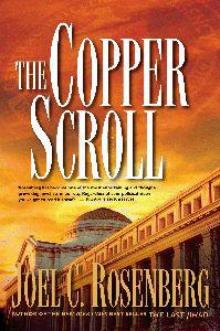 The Copper Scroll
The Copper Scroll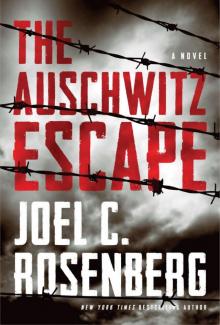 The Auschwitz Escape
The Auschwitz Escape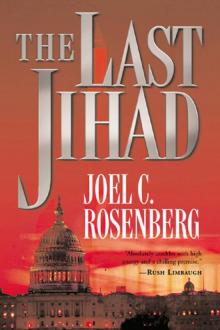 The Last Jihad
The Last Jihad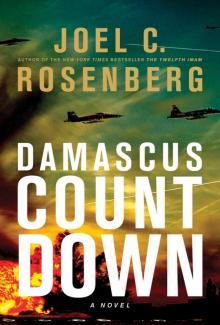 Damascus Countdown
Damascus Countdown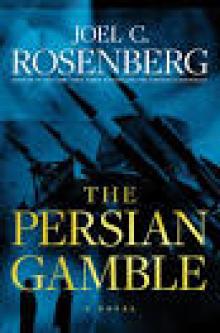 The Persian Gamble
The Persian Gamble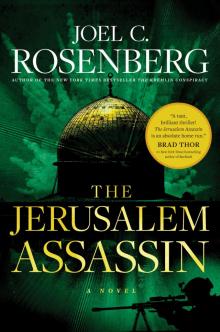 The Jerusalem Assassin
The Jerusalem Assassin Dead Heat
Dead Heat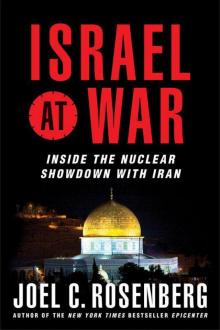 Israel at War: Inside the Nuclear Showdown With Iran
Israel at War: Inside the Nuclear Showdown With Iran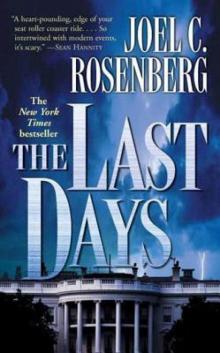 The Last Days
The Last Days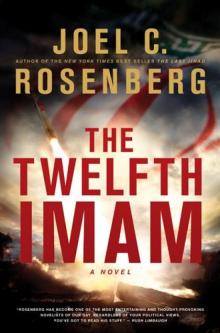 The Twelfth Imam
The Twelfth Imam Epicenter 2.0
Epicenter 2.0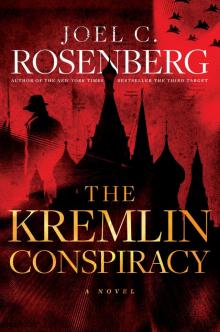 The Kremlin Conspiracy
The Kremlin Conspiracy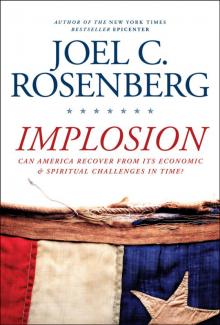 Implosion: Can America Recover From Its Economic and Spiritual Challenges in Time?
Implosion: Can America Recover From Its Economic and Spiritual Challenges in Time?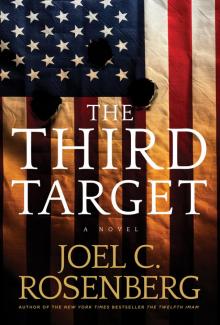 The Third Target: A J. B. Collins Novel
The Third Target: A J. B. Collins Novel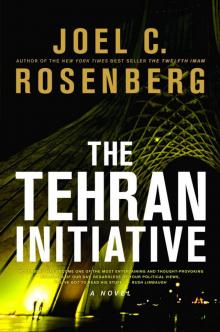 The Tehran Initiative
The Tehran Initiative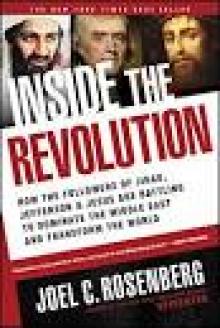 Inside the Revolution
Inside the Revolution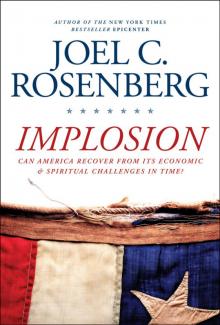 Implosion
Implosion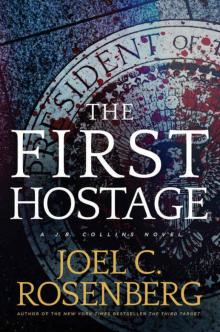 The First Hostage: A J. B. Collins Novel
The First Hostage: A J. B. Collins Novel